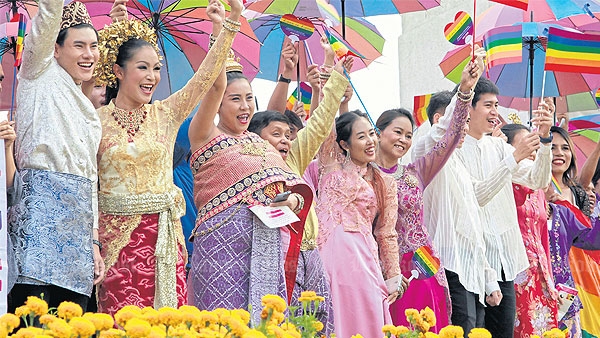Thailand will have to embrace the rights of lesbian, gay, bisexual and transgender (LGBT) people if it truly believes in safeguarding human rights, as their needs are important too, activists told a seminar yesterday.

Campaigners call for public awareness on LGBT rights and same sex marriage during a parade from the Democracy Monument to Sanam Luang, organised by the Foundation for Sexual Orientation and Gender Identity Rights and Justice (FOR-SOGI). Apichart Jinakul
Pongthorn Chanlearn, Chiang Mai-based MPlus Foundation director, said a civil union bill commissioned years ago by the Justice Ministry and the National Human Rights Commission but dropped from parliament because of the coup, is now being tweaked to include recommendations from civil society.
The NGOs' proposals covered pragmatic issues not covered by the government bill such as divorce, adoption, inheritance and allowing different genders to benefit from the law, said Mr Pongthorn, also vice-president of the Foundation for Sexual Orientation and Gender Identity Rights and Justice (FOR-SOGI).
The group yesterday organised a LGBT parade from the Democracy Monument to the seminar venue near Sanam Luang. The seminar topic was "From America to Thailand: Lessons learned from Same Sex Marriage Law".
Bobby Richey, of the US Department of Agriculture, who is married to a soldier, said debate on LGBT rights in the US has been intensifying since Minnesota became the first state in the conservative Midwest to legalise same sex marriage by legislation rather than a court order in 2013.
The US Supreme Court also ruled in 2013 that local court rulings in California and New York against same sex marriage were unconstitutional.
However, Mr Richey said it was taking a lot of effort for him and his partner to survive the hostility that was still coming their way in their respective professions and from society.
Even though gender rights are recognised now, LGBT people are still horribly discriminated against, he said.
Jullasak Kaewkan, a legal expert at the Law Reform Commission, said human dignity was a core argument used in securing equal rights for LGBT people in the US and he hoped that Thai lawyers and activists would work with "new imagination and strategy".
"From US experience, we should have our own electoral representatives push forward laws that are beneficial to various stakeholders and spectrums, especially the LGBT community," Mr Jullasak said.
In defending court cases, lawyers needed to refer to human rights principles as a key tool, he said.
Chumaporn Taengkliang, Togetherness for Equality and Action representative, said the Obama administration's policy towards LGBT groups was a big push in convincing the Supreme Court to reach its ruling.
She said elected governments have a big influence over policies that respect the rights of all types of people.


